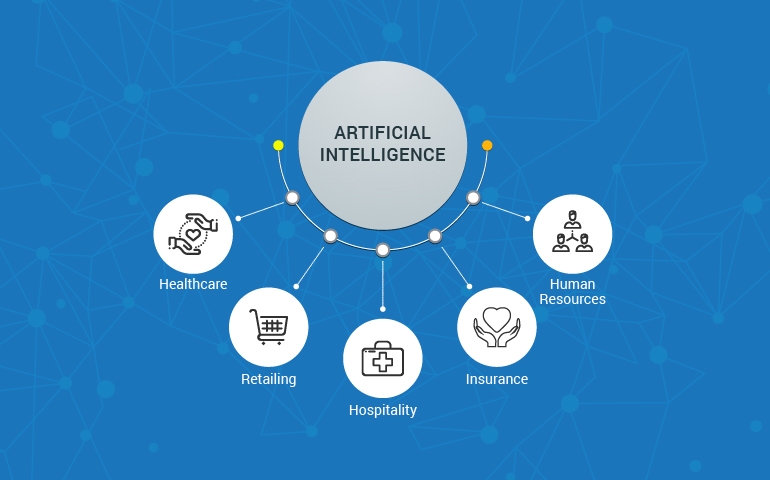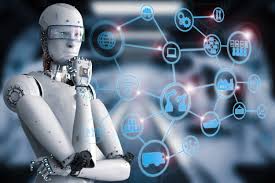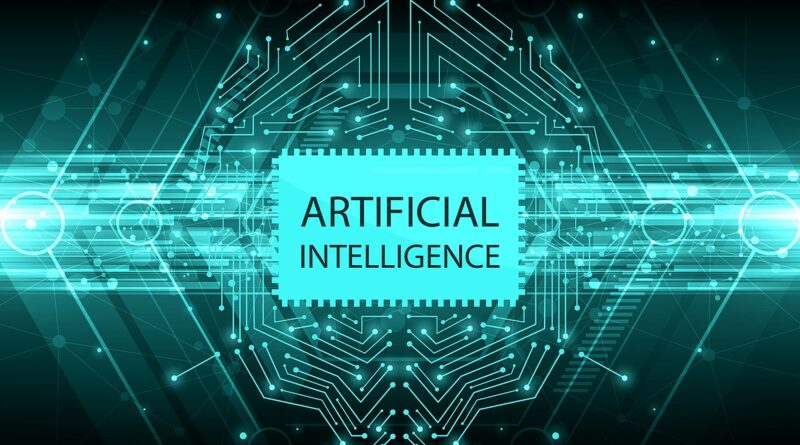How AI will affect different industries?
Artificial intelligence (AI) is already having a major impact on the industries, and its influence is only going to grow in the years to come. AI is already being used in a wide range of industries, from healthcare to manufacturing to transportation. And as AI technology continues to develop, we can expect to see even more innovative and groundbreaking applications.
Here are some predictions for how AI will affect different industries in the coming years:

Healthcare
AI is already having a major impact on the healthcare industry. AI-powered systems are being used to develop new drugs and treatments, diagnose diseases more accurately, and provide personalized care to patients.
For example, AI is being used to develop new drugs by analyzing large datasets of medical data to identify potential drug targets and predict how drugs will interact with the human body. AI is also being used to diagnose diseases more accurately by analyzing medical images, such as X-rays and MRIs, for signs of disease. Additionally, AI is being used to provide personalized care to patients by developing treatment plans that are tailored to the individual patient’s needs and characteristics.
In the future, AI is expected to play an even greater role in the healthcare industry. AI-powered systems could be used to automate tasks such as scheduling appointments, maintaining medical records, and providing patient care. AI could also be used to develop new medical technologies, such as self-driving ambulances and robotic surgery systems.
Manufacturing
AI is also having a major impact on the manufacturing industry. AI-powered systems are being used to automate tasks, improve quality control, and optimize production processes.
For example, AI is being used to automate tasks such as welding, painting, and assembly line work. AI is also being used to improve quality control by inspecting products for defects and identifying potential problems before they occur. Additionally, AI is being used to optimize production processes by scheduling machines, managing inventory, and predicting demand.
In the future, AI is expected to play an even greater role in the manufacturing industry. AI-powered systems could be used to create more efficient and sustainable factories. AI could also be used to develop new products and materials that were not possible before.
Transportation
AI is also having a major impact on the transportation industry. AI-powered systems are being used to develop self-driving cars and trucks, optimize traffic flow, and improve safety.
For example, AI is being used to develop self-driving cars and trucks by teaching them how to navigate roads, avoid obstacles, and obey traffic laws. AI is also being used to optimize traffic flow by reducing congestion and improving travel times. Additionally, AI is being used to improve safety by identifying potential hazards and developing systems to prevent accidents.
In the future, AI is expected to play an even greater role in the transportation industry. AI-powered systems could be used to create on-demand transportation services, optimize public transportation schedules, and reduce traffic congestion. AI could also be used to develop new transportation technologies, such as flying cars and hyperloop systems.
Retail
AI is also having a major impact on the retail industry. AI-powered systems are being used to personalize the shopping experience, recommend products, and prevent fraud.
For example, AI is being used to personalize the shopping experience by recommending products based on a customer’s past purchases and browsing history. AI is also being used to prevent fraud by identifying suspicious transactions and detecting counterfeit goods.
In the future, AI is expected to play an even greater role in the retail industry. AI-powered systems could be used to develop virtual dressing rooms, create personalized shopping recommendations, and automate checkout processes. AI could also be used to develop new retail technologies, such as augmented reality shopping experiences and cashierless stores.
Finance
AI is also having a major impact on the finance industry. AI-powered systems are being used to automate tasks, detect fraud, and make better investment decisions.
For example, AI is being used to automate tasks such as processing loan applications and managing customer accounts. AI is also being used to detect fraud by identifying suspicious transactions and patterns of behavior. Additionally, AI is being used to make better investment decisions by analyzing large datasets of financial data to identify investment opportunities and predict market trends.
In the future, AI is expected to play an even greater role in the finance industry. AI-powered systems could be used to develop personalized financial advice, automate trading, and detect fraud more effectively. AI could also be used to develop new financial technologies, such as blockchain-based payment systems and AI-powered investment advisors.
In addition to the specific examples above, AI is also expected to have a broader impact on industries by:
Automating routine tasks, freeing up workers to focus on more creative and strategic work
Improving decision-making by providing insights from large datasets that would be too complex or time-consuming for humans to analyze on their own
Creating new products and services that were not possible before
Disrupting existing business models and creating new opportunities for innovation
Overall, the impact of AI on different industries is likely to be significant and far-reaching. Businesses that are able to embrace AI and adapt to its capabilities will be well-positioned to succeed in the future.

Conclusion:
In conclusion, the impact of artificial intelligence (AI) on various industries is poised to be transformative and far-reaching. As AI technologies continue to advance, they are revolutionizing the way businesses operate, creating new opportunities, and addressing longstanding challenges. From healthcare to finance, manufacturing to entertainment, AI is reshaping the landscape of every sector. Here are some key takeaways from our exploration of how AI will affect different industries:
- Increased Efficiency: AI is streamlining processes and automating tasks, leading to increased operational efficiency and reduced costs across industries.
- Enhanced Decision-Making: AI-powered analytics and data-driven insights are empowering organizations to make more informed decisions and predictions.
- Personalization: AI is enabling businesses to offer highly personalized products and services, enhancing customer experiences and engagement.
- Safety and Security: In industries like cybersecurity and healthcare, AI is bolstering security measures and improving patient care through predictive analysis.
- Job Transformation: While AI may automate some tasks, it also creates new roles and opportunities for individuals with AI-related skills.
- Ethical and Regulatory Challenges: As AI becomes more prevalent, there are growing concerns about privacy, bias, and regulation that industries must address.
As AI continues to evolve, staying informed and adaptable is crucial for individuals and businesses in every sector. Embracing AI responsibly and strategically will be key to reaping its benefits while mitigating potential risks.
FAQs
Q1: How will AI impact the healthcare industry?
A1: AI is transforming healthcare by improving diagnostics, predicting disease outbreaks, and enhancing patient care through personalized treatment plans.
Q2: What role will AI play in finance and banking?
A2: AI is revolutionizing finance with automated trading, fraud detection, and personalized financial advice, making processes more efficient and secure.
Q3: How is AI changing the manufacturing sector?
A3: AI is optimizing manufacturing processes with predictive maintenance, quality control, and automation, leading to increased productivity and reduced downtime.
Q4: Can AI benefit the entertainment industry?
A4: Yes, AI is used in content recommendation, content creation, and audience analysis, enhancing content quality and user experiences.
Q5: Will AI lead to job loss in various industries?
A5: While AI may automate some tasks, it also creates new roles in AI development, data analysis, and AI ethics, potentially offsetting job losses.
Q6: What are the ethical concerns surrounding AI in different industries?
A6: Ethical concerns include bias in AI algorithms, privacy issues, and the need for robust regulations to ensure AI is used responsibly in various industries.
Q7: How can businesses prepare for AI integration?
A7: Businesses should invest in AI talent, data infrastructure, and AI strategy development to harness the benefits of AI in their specific industry.
Q8: Are there industries that may not be significantly affected by AI?
A8: While AI has the potential to impact nearly every industry, the extent of its influence varies depending on the specific sector and its readiness for AI adoption.
Q9: What are some examples of successful AI implementations in industries?
A9: Examples include self-driving cars in transportation, virtual assistants in customer service, and drug discovery in pharmaceuticals, among many others.
Q10: How can individuals acquire AI-related skills to stay relevant in their industries?
A10: Individuals can pursue AI-related courses, certifications, and online resources to acquire the skills needed to adapt to the changing job landscape driven by AI.




